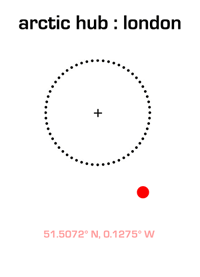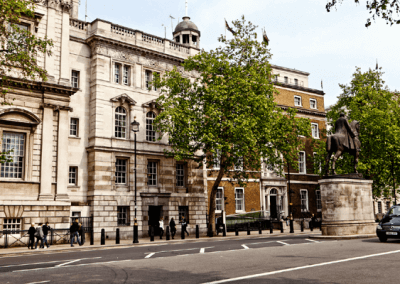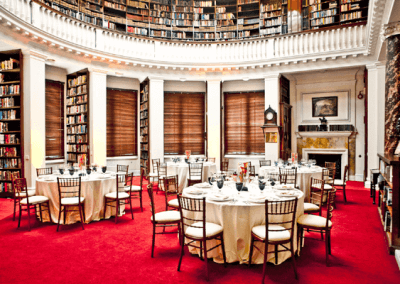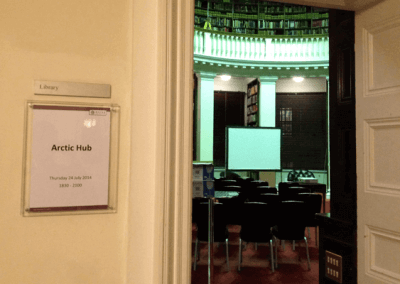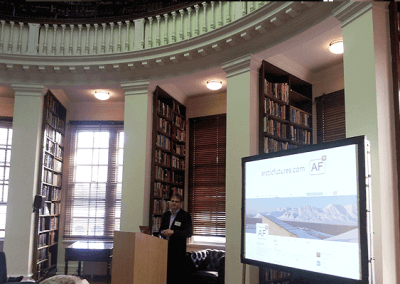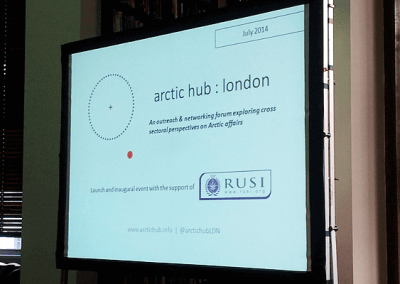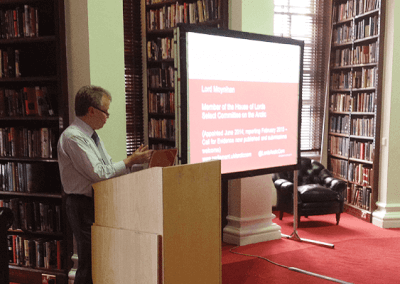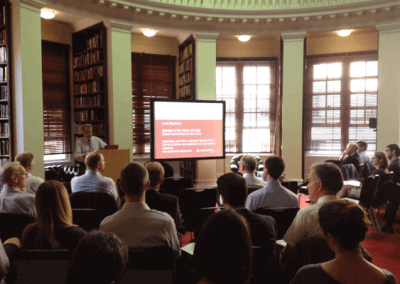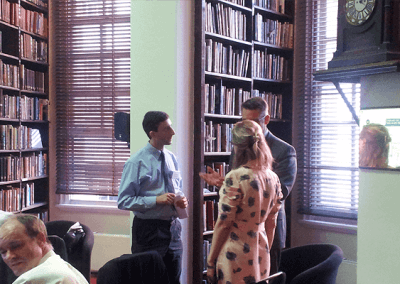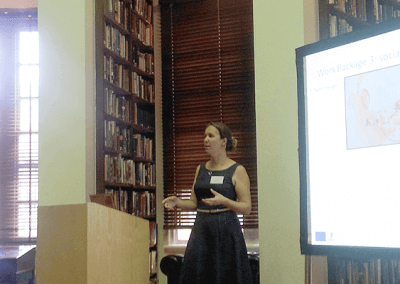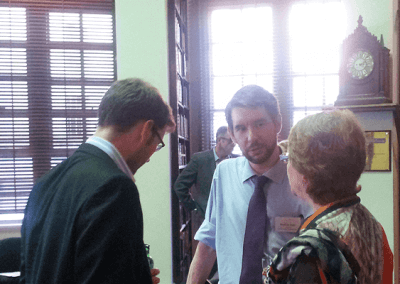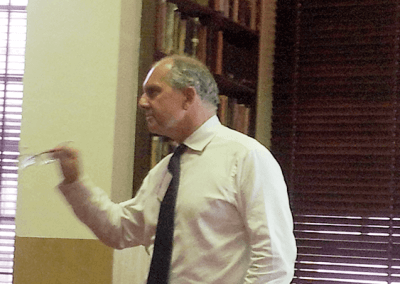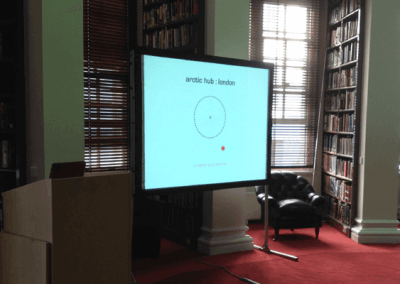The inaugural arctic hub : london outreach & networking forum was held on 24th July 2014 at the Royal United Services Institute on Whitehall
This invitation-only event was attended by 40 participants who also enjoyed a number of presentations & discussions during the evening
arctic hub would like to express its gratitude to RUSI & its staff for directly supporting this event
“@arctichubLDN congratulations. It was a highly enjoyable and interesting evening. #arctic#UK and great to have @LordsArcticCom represented”
Klaus DoddsPresentations

The House of Lords Arctic Committee: an introduction
The new House of Lords ‘ad hoc’ Select Committee on the Arctic – chaired by Lord Teverson – was appointed on 12th June 2014 to consider recent and expected changes in the Arctic and their implications for both the UK and its international relations, and will submit its recommendations and publish its final report by March 2015.
The issues to be explored include the potential impact of changes in the Arctic on shipping routes, energy resources, mineral extraction, the environment, international relations, security, tourism, fisheries and indigenous people.
Having recently held a private launch seminar to provide members with background information on a variety of Arctic issues the Committee will now move into formal witness hearings and public evidence gathering beginning from July 9th. A Call for Written Evidence will be published shortly, seeking expert contributions.
 We are delighted to be able to welcome Committee member Lord Moynihan to open the inaugural arctic hub : london in which he will offer an overview of the Committee’s establishment and key themes and then invite views from hub participants on what the priorities for the Committee’s work should be.
We are delighted to be able to welcome Committee member Lord Moynihan to open the inaugural arctic hub : london in which he will offer an overview of the Committee’s establishment and key themes and then invite views from hub participants on what the priorities for the Committee’s work should be.
http://www.parliament.uk/arcticcom | @LordsArcticCom | @lordtev

What might the social and economic impacts of Arctic sea-ice loss be?
ICE-ARC is an EU-funded project launched in January 2014, that is particularly focussed on the implications of current and future Arctic sea-ice change. It aims to understand and quantify the multiple stresses involved in future changes in the Arctic marine environment with a view to assessing the climatic (ice, ocean, atmosphere and ecosystem), economic and social impacts of these stresses at both regional and global scales.
Geo-physical and ecosystems models will be used to generate projections of environmental change that will be fed into an economic impact model (PAGE-ICE) specially reconfigured for understanding cryosphere-driven impacts. This will calculate the impacts of the projected physical changes upon both Arctic region and global economic and social systems.
This will be the first time that a leading global impact model has been coupled with a physical climate model to directly assess the economic impact of observed and projected climate change events. It is being applied to the Arctic as it is the oceanic region of greatest current concern to the global community because of the rapid pace of visible change being observed there.
The outputs of the entire project are intended to provide more effective policy and management options for addressing societal responses to climate change.
 Dr. Elaina Ford (ICE-ARC Programme Manager) from the British Antarctic Survey will join us to present an overview of this ground-breaking project and discuss its aims, challenges and implications for future
Dr. Elaina Ford (ICE-ARC Programme Manager) from the British Antarctic Survey will join us to present an overview of this ground-breaking project and discuss its aims, challenges and implications for future

Economic development and the Arctic Council: what next?
With the Arctic Council now into its second rotation, the issue of future economic development across the region is becoming increasingly prominent with a whole range of initiatives now being created to explore, frame and govern this issue: from the Arctic Council’s own Arctic Economic Council through to the independent Arctic Business 2014 conference. As the primary regional political forum – developed out of environmental protection and sustainability principles – how can the Arctic Council best engage with business going forward?
 Tim Reilly from the Arctic Advisory Group will open a discussion on whether business needs to find its own way in the Arctic and more forcefully initiate and drive this dialogue (whilst remaining respectful of the Arctic Council’s mandates).
Tim Reilly from the Arctic Advisory Group will open a discussion on whether business needs to find its own way in the Arctic and more forcefully initiate and drive this dialogue (whilst remaining respectful of the Arctic Council’s mandates).
As such, is this an inflection point in the Arctic Council’s raison d’etre as it seeks to balance themes of more assertive decision making with its historic status as a consensus based body? What might the reaction of business be to this evolving paradox given its own investment needs and dynamics?
“Good launch of @arctichubLDN last night, insights from @LordsArcticCom and others! #arctichub”
Ulf SamuelssonRegistered companies & organisations
Airbus Defence and Space
Arctic Advisory Group
BP
British Antarctic Survey
British Institute of International and Comparative Law
Canadian High Commission
Centre for Polar Observation & Modelling
Cornfield & Partners Ltd
Dassault Systemes, GEOVIA
Embassy of Finland
Embassy of Sweden
House of Lords Arctic Committee
Inmarsat
International Maritime Organisation
Institute for Risk and Disaster Reduction, University College London
MENAS
Ministry of Defence
NERC Arctic Office
Oxford University Polar Forum (OUPF)
Royal HaskoningDHV
Royal Holloway University of London
Royal United Services Institute
Scott Polar Research Institute, Cambridge University
SRK Exploration
Telespazio SpA
The Institute for Statecraft
The Royal Society
UK Foreign & Commonwealth Office
U.S. Embassy
World Wildlife Fund
Gallery
“@arctichubLDN congrats on an excellent evening of presentations and good conversation!”
Duncan Depledge
